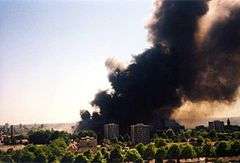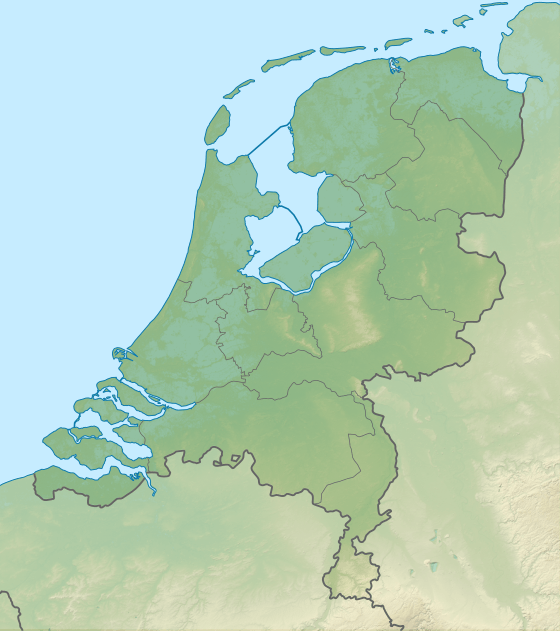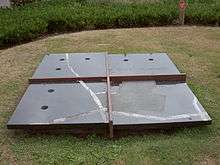Enschede fireworks disaster
The Enschede fireworks disaster (Dutch: vuurwerkramp in Enschede) was a catastrophic fireworks explosion occurring at the S.E. Fireworks depot on 13 May 2000 at 13:00 GMT, in the eastern Dutch city of Enschede.[1]
 The suburb of Roombeek on fire | |
| Date | 13 May 2000 |
|---|---|
| Time | 13:00 GMT |
| Location | Enschede, Netherlands |
| Type | Fireworks disaster |
| Cause | Fire |
| Deaths | 23 |
| Non-fatal injuries | close to 1,000 |
| Property damage | 1900 buildings damaged or destroyed |
| Arrests | Rudi Bakker, Willie Pater, André de Vries |
| Sentence | 12 months for Rudi Bakker and Willie Pater; 15 years for André de Vries (later acquitted) |

A fire led to an enormous explosion which killed 23 people including four firefighters, and injured nearly 1,000.[2] A total of 400 homes were destroyed and 1,500 buildings damaged. The first explosion had a strength in the order of 800 kg TNT equivalence, while the strength of the final explosion was within the range of 4,000–5,000 kg TNT.[3] The biggest blast was felt up to 30 kilometres (19 mi) away. Fire crews were called in from across the border in Germany to help battle the blaze; it was brought under control by the end of the day.
S.E. Fireworks was a major importer of fireworks from China and a supplier to pop concerts and major festive events in the Netherlands. Prior to the disaster it had a good safety record and met all safety audits.[4]
Footage of the disaster was featured in a 2009 episode of the Discovery Channel show Destroyed in Seconds.
Damage
A 40-hectare (100-acre; 0.4 km2) area around the warehouse was destroyed by the blast.[5] Enschede was built around the S.E. Fireworks factory, which was the only one in the Netherlands to be located in a residential area.[6] This caused around 400 houses to be destroyed, 15 streets incinerated and a total of 1,500 homes damaged, leaving 1,250 people homeless, essentially obliterating the neighbourhood of Roombeek. Ten thousand residents were evacuated, and damages eventually exceeded 1 billion guilders (€454 million).[7]
The Dutch Government warned that potentially harmful asbestos was released into the air by the explosion.[8] The fire spread to the nearby Grolsch Beer brewery which had an asbestos roof. It was later demolished and closed; a replacement opened close by in Boekelo in 2004.
Cause
A fire is believed to have started in the work area of the central building where some 900 kg (2,000 lb) of fireworks were stored. It then spread outside the building to two full shipping containers that were being used to illegally store more display incendiaries. When 177 tonnes (174 long tons; 195 short tons) of fireworks exploded, it destroyed the surrounding residential area.[9]
One theory to explain the large scale of the disaster was that internal fire doors in the central complex – which might otherwise have contained the fire – had been left open. Theoretically, an explosion was considered highly unlikely because the fireworks were stored in sealed bunkers specifically designed to minimize such risk. However, the illegal use of shipping containers reduced safety, particularly as they had been arranged closely together at ground level and had not been separated either by earthworks or other partitioning.[10]
One week prior to the explosion, SE had been audited. The company was judged to have met all official safety regulations while the legally imported fireworks had been inspected by Dutch authorities and deemed safe.[11] However, after the explosion, residents from the affected district of Roombeek—a poor, working-class neighbourhood—complained of government inaction and lack of interest, saying the whole disaster was just waiting to happen.[4]
When it was built in 1977, the warehouse was outside the town, but as new residential areas were built it became surrounded by low-income housing.[12] Residents and town councillors stated they did not even know that there was a fireworks warehouse in their area. Later in the court case, the judge said that city officials failed to take steps even when they knew laws had been broken. They acted "completely incomprehensibly" by allowing the company to expand, for fear that the city would have to pay the cost of moving S.E. Fireworks to another location.[13]
Legal proceedings
On May 20 Dutch authorities issued an international arrest warrant for the two managers of the company, Rudi Bakker and Willie Pater, after they fled their homes, which were empty when searched.[14] Willie Pater handed himself in on the same day, and Rudi Bakker the day after.[15][16]
In April 2002, the owners were sentenced to six months' imprisonment each for violation of environmental and safety regulations and dealing in illegal fireworks alongside a fine of €2,250 each. However, they were both acquitted of the more serious charges of negligence for the fire.[17]
In May 2003, Arnhem Appeals Court acquitted 36-year-old André de Vries of arson. Almelo Court had originally (May 2002) tried and convicted De Vries of arson and sentenced him to 15 years imprisonment.[18]
In February 2005, after a four-and-a-half-year legal battle, the six month sentence of each of the owners was increased to twelve months each.[19]
A total of €8.5m in compensation was awarded to the victims of the explosion, according to the organisation in charge of distributing the compensation, the UPV, having assessed 3,519 claims. Three hundred people received cash for incurring extra costs, 136 people received money for loss of income, and 1,477 people received compensation for health problems.[20]
Dutch fire safety regulations

The S.E. Fireworks disaster led to intensified safety regulations in the Netherlands concerning the storage and sale of fireworks. The Roombeek area that was destroyed by the blast has since been rebuilt. Since the catastrophe, three illegal fireworks depots were closed down in the Netherlands.[21]
Memorials
There have been annual public memorial services in Roombeek since 2000 led by the mayor Jan Mans, and commonly ending on the Stroinksbleekweg. The theme of 2004 was "homecoming".[18]
See also
References
- "Dutch fireworks disaster". BBC. 13 May 2000. Retrieved 13 June 2015.
- "Firework Disaster Enschede 13 May 2000". huisvanverhalenenschede.nl. Retrieved 16 May 2017.
- T. Bedford, P. H. A. J. M. van Gelder, 2003, "Safety and reliability: proceedings of the ESREL 2003 European safety and reliability conference", p.1688
- Castle, Stephen (15 May 2000). "After 400 homes and 15 streets are incinerated by firework blast, the Dutch ask: Was it arson?". The Independent. London. Retrieved 2 May 2010.
- "Geslaagde transformatie van stadswijk na vuurwerkramp". de Volkskrant (in Dutch). 10 May 2005. Archived from the original on 14 October 2012.
- "Dutch fireworks disaster". BBC. 14 May 2000. Retrieved 13 June 2015.
- "Dossier: Vuurwerkramp Enschede 2000 - Economie". Nederlands Dagblad (in Dutch). Archived from the original on 12 February 2015.
- "Search for Enschede survivors ends". BBC. 15 May 2000. Retrieved 13 June 2015.
- Online Oosting zag iets over het hoofd in Enschede, NRC Handelsblad, 23 March 2001
- Paul, Hendrik. "Netherlands fireworks factory explosion—the downside of the Dutch social model – World Socialist Web Site". www.wsws.org. Retrieved 13 June 2015.
- "Dutch blast factory boss arrested". BBC. 19 May 2000. Retrieved 13 June 2015.
- "Inquiry into firework blast". BBC. 15 May 2000. Retrieved 13 June 2015.
- DEUTSCH, ANTHONY (2 April 2002). "Dutch Fireworks Owners Sentenced". Midland Reporter Telegram. Retrieved 13 June 2015.
- "Arrest warrants for Enschede owners". BBC. 19 May 2000. Retrieved 13 June 2015.
- "Dutch fireworks owner under custody". BBC. 19 May 2000. Retrieved 13 June 2015.
- "Dutch police quiz fireworks factory owners". BBC. 20 May 2000. Retrieved 13 June 2015.
- "Dutch fireworks blast bosses sentenced". BBC. 2 April 2002. Retrieved 13 June 2015.
- Expatica.com Archived 3 October 2012 at the Wayback Machine, accessdate 17 April 2009
- "Fireworks directors jailed for fatal explosion | Dutch News | Expatica the Netherlands". www.expatica.com. 1 February 2005. Retrieved 13 June 2015.
- "Dutchnews.nl". Dutchnews.nl. 19 September 2007. Retrieved 9 July 2014.
- Paul, Hendrik (May 2000). "Netherlands fireworks factory explosion—the downside of the Dutch social model – World Socialist Web Site". www.wsws.org. Retrieved 13 June 2015.
External links
| Wikimedia Commons has media related to Enschede fireworks disaster. |
- In pictures: Firework blaze – BBC News
- Satellite Map Imagery – Google Maps